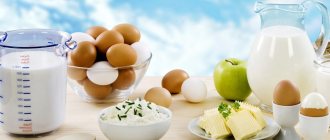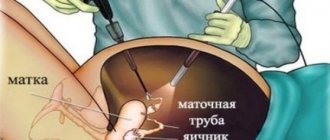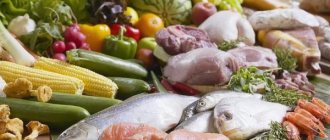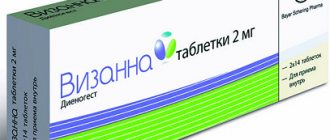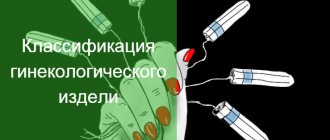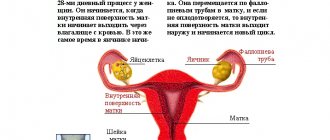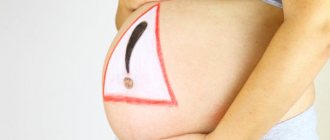Doctors' opinions on diets during menstruation
Any gynecologist and nutritionist will categorically prohibit such a fact as diet during menstruation. This is due to many factors.
With blood discharge, useful substances and minerals leave the body. This provokes weakness of the body, drowsiness, inattention, pain and other phenomena that accompany the menstrual cycle.
If you infringe on the body's needs with a diet during the period of complete menstrual cleansing, you can harm your general condition. Such actions are fraught with exhaustion of the body, attacks of weakness and fainting. In addition, a strict diet during menstruation can harm women's health.
For these reasons, doctors categorically prohibit going on a diet during the menstrual cycle, but following a special profile diet during menstruation is approved and recommended.
Sample menu
You can use the following menu suggested by nutritionists.
First option:
- For breakfast you can eat a boiled egg, a slice of rye bread, a glass of fresh berries or fruit,
- For lunch, we recommend boiled chicken breast or turkey meat, steamed or baked vegetables,
- For dinner you need to drink one glass of kefir or low-fat milk, eat a glass of fresh fruit.
Option two:
- For breakfast you are allowed to eat two hundred grams of cottage cheese and one hundred grams of oatmeal without salt,
- For lunch, you can steam fish, make a vegetable salad with some herbs,
- For dinner you can prepare a dessert of cottage cheese and berries, as well as steamed seafood.
Third option:
- For breakfast, oatmeal cooked in water without adding salt, berries,
- For lunch you can eat creamy vegetable soup,
- For dinner, a fruit salad and a few nuts are good.
You can stick to this diet, or you can make a list of dishes yourself that will be used when following a diet for weight loss during menstruation. At the same time, dishes should not be fried; it is better to steam them, bake them, boil them or use the grill.
Sticking to a diet during menstruation is an interesting and effective method for women losing weight. During this period, natural cleansing and renewal of the female body occurs.
But the process of losing weight should proceed smoothly, you need a nutritious diet so as not to provoke the appearance of unpleasant symptoms.
Why are periods accompanied by weight gain?
During menstruation, many girls do not lose weight, but rather gain weight. This process is provoked by an increased amount of the hormone progesterone, which retains fluid in the body. As a result, menstruation is accompanied by the addition of 3–4 kilograms of excess weight, the presence of which lowers an already bad mood.
The second reason for this fact is the body's fear of exhaustion. How does this happen? During menstruation, the body loses many useful vitamins and minerals, which are simply necessary for rational functioning. With such depletion, the body begins to look for additional sources of obtaining its needs, but finds them not in fat deposits, but in organs, which greatly weakens the overall health.
When food is consumed and absorbed normally, the body does not use newly arrived reserves, but begins to put them aside for a “rainy day,” that is, in fat deposits.
That is why the body during menstruation needs constant support, which includes increased consumption of foods that are healthy for this period.
How to fight for the return of menstruation
A slim figure will not be happy when a woman realizes that she has lost her period after a diet. After all, this means the inability to become a mother, the acquisition of gynecological diseases and early aging. The body needs immediate recovery. Taking action quickly increases the chance of a full return to normal at low cost. First of all, it is necessary to restore the delivery of vitamins, minerals and other components to all organs and systems. This does not just mean switching to a high-calorie diet, which will nullify all efforts to lose weight. Rapid weight gain will not solve the problem, but will add new ones.
The diet should be balanced, containing the required amount of fats, proteins and carbohydrates, as well as vitamins and minerals. The best way to restore menstruation after a diet is to be explained by a gynecologist. After all, if the balance of hormones is disturbed, you will probably need medications to normalize it:
- Duphaston. This is synthesized progesterone, which will compensate for the deficiency produced by the body;
- Progesterone. Injections of the drug will quickly restore the functioning of the reproductive system;
- Preparations containing estradiol valerate.
Pharmaceuticals are prescribed based on the results of hormone analysis. You cannot use them yourself, this can lead to disaster in the reproductive and endocrine spheres.
Folk remedies for returning menstruation
Those who are interested in medicinal plants know how to get their periods back after a diet. Herbs contain vitamins and other substances that help the body recover. Therefore, with your doctor’s permission and for no longer than 2 weeks, you can take:
- Decoction of onion peels. Take 1 tbsp. raw materials and 1 cup of boiling water, cook for 3 minutes, infuse until brown. The strained product is drunk once a day after meals;
- Melissa tea. The plant calms and restores appetite;
- A decoction of parsley and mint seeds. The former contain a lot of vitamin C; mint helps normalize the nervous system. Plants are taken in a ratio of 3:1, pour 0.5 liters. water, boil for 10 minutes. After cooling, filter and divide the resulting mixture into 2 doses. The delay in menstruation will stop after the diet;
- Infusion of wormwood. 1/3 tbsp. chopped herbs are placed in 200 ml. boiling water, leave in a thermos for 4 hours. The resulting product is intended to be taken 4 times a day before meals. The infusion increases appetite, stimulates the reproductive organs;
- Infusion of a mixture of chamomile, valerian, mint. Each plant is taken equally, poured with boiling water and kept, wrapped, in a closed container for 2 hours. Drink half a glass of infusion 3-4 times a day. If there are no periods after the diet, such a decoction will help return the cycle to normal, due to its positive effect on hormone-producing organs and the nervous system;
- A decoction of a mixture of oregano, nettle, yarrow, rose hips. Equal parts of raw materials are mixed, 2 tbsp. placed in 0.5 l. boiling water, cook for 5 minutes, leave for 1 hour. After straining, drink 100 ml. 2-3 times a day.
The diet during menstruation should be more aimed at alleviating the condition at the moment. This does not at all contradict the principles of staying slim, as long as you don’t put weight loss on a pedestal higher than your own health.
Before using any medications, you should consult a specialist doctor. There are contraindications.
How to avoid gaining weight during your period?
Weight gain during menstruation is common. Is it possible to lose weight during menstruation or is it better to immediately protect the body from the appearance of excess fat deposits? The answer to this question is obvious. Of course, it is better to control your forms.
For this, a few tips can help on how not to gain weight during menstrual periods:
- During menstruation, heavy physical activity is prohibited. But any doctor will approve of moderate sports activities. Running is considered a good method to keep the body in constant tone. Morning jogging will not only keep your body fit, but will also enrich your blood vessels with oxygen.
- To keep your body in shape, you should monitor not only your diet, but also its quantity. Dietary foods in large quantities can also end up as body fat. To reduce the dose of food consumed, it is necessary to tighten the stomach, then saturation will come much faster. To do this, you need to avoid any drinks for an hour after eating.
- You should eat foods that contain serotonin, the so-called happiness hormone. It is found in corn, bananas and tomatoes. Serotonin levels affect mood, and consequently self-esteem.
To always look good, you should love yourself and your body. Otherwise, any corrective actions will become useless, since they will still not be impressive.
General rules
A woman’s hormonal background changes throughout the cycle and affects her mood, general condition, performance and appearance. Due to the influence of hormones (in particular, progesterone in the second half of the cycle, starting from days 15-16), a natural reaction occurs before menstruation - fluid retention, which causes weight gain and swelling of the face, arms and abdomen.
On average, weight fluctuations are 2-3 kg. Don't be upset - these are not extra pounds due to fat deposits, but fluid that will go away with the end of your period. On the eve of critical days, irritability appears, many note a strong craving for sweets and an increase in appetite. The body tries to stock up on nutrients for future use. If you do not control your appetite, carbohydrates will be stored “in reserve” in the form of fat. A possible cause of sweet cravings is low blood sugar due to skipping meals. Therefore, you need to eat small portions and often - up to 6 times a day.
All effects of progesterone will be expressed before the start of the next cycle. At this time, the woman experiences premenstrual tension syndrome , which includes, in addition to the symptoms described above, bloating, drowsiness , lethargy and soreness of the mammary glands.
A diet for PMS will help correct this condition. A week before your period, it is recommended:
- limit the amount of salt, salty foods (soy sauce, salted fish, herring, salted nuts, cheeses, sausages, pickles and marinades);
- use caution with caffeine-containing drinks and alcohol, which retain water and further increase swelling;
- include a decoction of diuretic herbs in the diet: dill, parsley, horsetail, corn silk, celery stalks.
Already a week before the start of your period, you need to eat food rich in fiber and complex carbohydrates (cabbage, apples, cereals, legumes, bran, whole grain bread, seeds and sunflower seeds). Fiber helps remove water from the body. It has been noticed that seafood helps fight chocolate cravings. This is an ideal nutrition option during this period - it contains few calories and sufficient amounts of protein, iron and zinc.
Do I need a diet during menstruation to lose weight? Directly during menstruation, special nutrition for the purpose of losing weight is contraindicated. It must be said that this is not the best time to diet. This will only worsen depression and be stressful for the body.
These days there is a decrease in the level of estrogen , a hormone necessary for the production of serotonin (the mood hormone). Therefore, many women are prone to depression or at least depressed mood. This also explains the craving for sweets, especially chocolate. Nutritionists advise sticking to a medium-calorie diet during this period, and not going on fasting days or strict diets.
Taking into account the hormonal changes during your period, it becomes clear why attempts to lose weight are futile. Weight gain depends on progesterone, the level of which increases before menstruation. This hormone prepares the female body for pregnancy and promotes the accumulation of fat deposits. But this process can be influenced by adhering to proper nutrition.
Nutrition during menstruation should be rational and healthy. The beginning of the cycle is associated with discomfort, and for many women with painful sensations. During the first days, it is advisable to consume only complex carbohydrates that are slowly absorbed by the body: whole grain bread, cereals (especially rice and buckwheat), legumes, various vegetables and fruits.
Give up “bad” carbohydrates (sweets, cakes, pastries, sweet pastries, cookies) and replace them with fruits and berries, honey, dried fruits, cereals with added honey and dried fruits. Include dried apricots, prunes, raisins, dried pears in your diet - they are quite sweet due to their fructose content and, in combination with cottage cheese or yogurt, can easily replace desserts. These products will help improve your mood, provide vitamins and energy, and at the same time there will be less risk of gaining extra centimeters and kilograms.
During this period, it is better to exclude extractive and central nervous system stimulating substances and dishes:
- coffee Tea;
- strong meat broths, fried and stewed meats;
- chocolate.
Including magnesium-rich foods in your diet will help overcome irritability and headaches. We get magnesium by eating cereals, nuts, bran, seeds, dark green vegetables, peas and beans, buckwheat and millet groats. Nuts and seeds (flax, sunflower, pumpkin, poppy, sesame) can be a healthy snack at work when you feel hungry. They also contain vitamin E, which regulates the production of serotonin and has a beneficial effect on the reproductive system. Therefore, additionally include vegetable oils and soybeans in your diet.
Potassium regulates water-salt metabolism and promotes the removal of fluid from the body, and this is very important during this period; it also prevents the occurrence of depression. All nuts, dried apricots, raisins, prunes, bananas, cabbage, and leafy vegetables contain a lot of potassium.
In the middle of the cycle (8-14 days), you can add more calories and include protein foods: seafood, fish and meat dishes, eggs, more cottage cheese. Carbohydrates should be reduced. The calorie content of food should be 1400 kcal.
At the end of the cycle (days 15-28), you can add sweet foods, but avoid eating heavy foods. As before, vegetables and fish should predominate in the diet.
If you have painful periods, you should include in your diet:
- bananas and chocolate;
- vitamins and minerals (they help reduce the tone of the uterus);
- drink wine with orange juice at night;
- give up coffee, salt and salty foods.
You can maintain your iron levels by eating:
- red meat;
- oysters, squid, shrimp;
- caviar, red fish;
- whole buckwheat porridge;
- apples, lettuce, prunes, dried apricots, raisins;
- broccoli and kohlrabi;
- liver (veal, beef, chicken);
- pomegranate juice.
Many women are bothered by bloating. In this case, you need to temporarily avoid cabbage, yeast bread, potatoes, bananas, legumes, grapes, carbonated drinks, and kvass. Herbal teas can help reduce pain. You can drink tea consisting of 1 teaspoon mint and 2 teaspoons green tea, nettle infusion.
High-intensity training is also not recommended during this period. From the fourth day of menstruation, you can do your usual exercise in the gym, since from the 4th to the 25th day of the cycle, women can easily tolerate all kinds of physical activity.
You can start a low-calorie diet immediately after the end of your period - during this period, your appetite decreases and you can complete the nutrition you have planned to the end without stressing the body. A favorable time to start a diet is the period of estrogen influence, the level of which increases every day after the end of menstruation until the 14-15th day of the cycle. This hormone helps the body burn fat, improves mood and suppresses appetite. At this time, a woman is in a good mood, she is motivated and confident, and her body can easily accept changes, particularly in nutrition.
Is it possible to fast during menstruation?
Medicine is not against fasting, which is used to treat severe allergies , psoriasis , eczema , bronchial asthma and other diseases. As for fasting during menstruation, opinions are divided. Periodic bleeding is not a contraindication, but some believe that it is still not worth starting it during this period. If you are already in the process of fasting, then there is no need to interrupt it during your period.
Another opinion is based on the fact that fasting, especially for 2-5 days, should be timed to coincide with the beginning of menstruation. The end of them indicates the renewal of the woman’s body, the need for food, and the need to get out of hunger. If long-term fasting is undertaken (7-30 days), then the exit from it should also be timed to coincide with the end of menstruation.
You need to know that fasting can cause disruption of the menstrual cycle - it becomes erratic or periods may be completely absent. The cycle will have to be restored with hormonal drugs, which poses the risk of weight gain if fasting is undertaken for this purpose. Remember that prolonged fasting at home is dangerous due to all sorts of complications (vomiting, convulsions, increased blood pressure), and it is also impossible to take appropriate measures to remove ketone bodies and reduce intoxication .
Also, many people note that after the diet there are no periods. An unbalanced low-calorie diet (at the level of 1000-1200 kcal) and limited intake of proteins, fats and carbohydrates causes hormonal disorders. The reproductive system is especially sensitive and, against the background of significant weight loss, an imbalance of sex hormones develops. Long-term absence of menstruation leads to irreversible changes ( infertility ).
Proper vitamin diet during menstruation
Menstruation and losing weight are completely compatible things. Only the diet during the menstrual cycle differs significantly from traditional methods of losing weight. It is aimed at a general strengthening effect on the body and a proper diet. Saturating the body with essential minerals and vitamins helps normalize weight and reduce it.
- During the menstrual cycle, the body loses a large amount of iron. You can find it in the following products: apples, buckwheat, dried apricots and raisins, pomegranate juice, as well as in liver and other offal.
It is important to know that iron is not absorbed with fermented milk products, so their consumption should be separated by a short break.
- Continuous cravings for sweets during the menstrual cycle are explained by a lack of magnesium. Chocolate is the first source of this vitamin. But in order not to harm the slimness of the body, chocolate can be replaced with other sweets. For example, corn has an even greater supply of magnesium than chocolate, and does not harm the figure. Magnesium is also found in any seeds, dark green vegetables, cereals and bran.
- Lack of potassium in the body provokes headaches and stress. It is found in nuts, bananas, cabbage and leafy vegetables. By the way, nuts are considered a dietary product. They saturate the body well, suppressing hunger as much as possible and are low in calories. Therefore, it is recommended to eat nuts as a snack when you are hungry.
- Fatty acids prevent smooth muscle spasms. They can be found in large quantities in oily fish. And in order not to affect weight, this product should be consumed boiled or steamed.
- And of course, calcium. During menstruation, a lack of this vitamin affects pain in the head and lower abdomen, and also causes cramps. Calcium is found in any fermented milk products, cottage cheese and hard cheese. In addition, these products are essential in any diet, as they improve the digestive process and perfectly satisfy the feeling of hunger. Fermented milk products are best absorbed from six to ten o'clock in the evening.
The health of the body depends entirely on nutrition. A proper diet will help not only to understand how to lose weight during menstruation, but also to normalize all the working processes of organs and systems.
How to deal with discomfort during menstruation with the help of diet?
Diet is not only a method of combating excess weight. With the help of a balanced diet, you can get rid of pain, spasms and swelling.
Menstruation and weight loss: is there a connection?
In fact, there really is a connection between these concepts: the processes occurring in the female body during the process of getting rid of extra pounds that burden the body are very closely related to the monthly cycle. During menstruation, the body can begin to actively “burn” fat deposits, or, conversely, increase the rate of its accumulation. In order to accurately navigate which days affect a particular process, you should consider the connection between menstruation and weight loss in more detail.
The fact that the first day of menstruation is also considered the first day of the cycle is well known. During this period, the female body adjusts to active work: all processes occur much faster, which helps to increase the rate of “burning” fat deposits.
6-8 days before the start of your period, you should limit foods such as pickles and smoked meats in your diet. These products help increase water reserves in the body, and this period is already characterized by increased fluid accumulation.
From the first day of the menstrual cycle, you need to more carefully monitor your diet and introduce foods into your diet that help eliminate excess deposits. These include legumes, rice (it was mentioned more than once on the website hudeem-bez-problem.ru), boiled potatoes, wholemeal bread, in general, all those products that contain complex carbohydrates that are very slowly absorbed by the body.
It should be remembered that losing weight and menstruation are inextricably linked.
During this period, you need to be especially careful with flour, sweets and fruits: these products are rich in easily digestible simple carbohydrates, increased consumption of which contributes to rapid weight gain, which can only be gotten rid of with the help of a strict diet
In the second half of the cycle, the woman’s body relaxes and adjusts to a calm mode of accumulating “reserves”. This period is characterized by an aggravated feeling of constant hunger, during which one craves for “sweets” and “tasty things.” The second half of the female cycle involves the consumption of protein foods (buckwheat, lean fish and meat, dairy and seafood), but carbohydrates in the diet should be reduced as much as possible.
Diet for edema during menstruation
Swelling of the body during the menstrual period is more the norm than a deviation. Due to excess progesterone, fluid is retained in the body and contributes not only to weight gain, but also to unpleasant swelling of the body. To prevent this phenomenon, you should consume foods rich in fiber a week before and during your period. It promotes the rapid removal of fluid from the body.
High fiber content can be found in cabbage, apples and legumes. You should also consume herbs that have a diuretic effect:
- dill,
- parsley,
- basil,
- celery,
- lemongrass
They can be used as a sprinkle in dishes as a seasoning. But you should avoid salty and spicy foods.
Treatment
It is possible to reduce water retention and bloating during your period with home remedies, lifestyle changes, and medications. This will affect the causes of weight gain.
Drink more water.
It sounds counterintuitive, but staying hydrated can reduce water retention. Your body will retain more fluid if you are dehydrated.
Eat healthy foods.
If you have food cravings, keep a variety of options on hand. Try eating foods like fruit or protein bars when sugar cravings strike.
Take various medications.
Diuretics are pills that reduce water retention by increasing urine production. See your doctor for a prescription.
Take magnesium supplements. Be sure to consult your doctor before taking any supplements. But, if you get the OK, magnesium may reduce: water retention, bloating, sugar cravings, and emotional symptoms.
Keep moving more.
You can reduce fluid accumulation by walking and moving around. Exercise will also make you sweat and get rid of excess water.
Diet against bloating during menstruation
Many women suffer from bloating during their menstrual cycle. Therefore, you should avoid products that provoke this effect:
- yeast bread,
- cabbage,
- bananas,
- potato,
- grape.
It is better to give preference to leafy vegetables and cucumbers.
Diet for pain during menstruation
Most women suffer from pain and cramps in the lower abdomen during their periods. Green tea with peppermint will help reduce this pain. And also for painful menstruation, it is recommended to drink arnica infusion. Nettle infusion will help with heavy bleeding.
During this period, you should limit the consumption of foods that accelerate the blood, as this will lead to increased bleeding and pain. Alcohol and caffeine have this function.
What happens to appetite and tastes?
Most women notice an increase in appetite a few days before their period. As a result of the spasms characteristic of this process, it may disappear for several hours, but when the pain goes away, it returns with renewed vigor. This is due to an increase in the amount of the male hormone testosterone before menstruation.
The diet during menstruation may also change due to the appearance of other taste preferences during this period. Cravings for sweet, spicy, salty, that is, food that a woman outside of her critical days could be indifferent to or love, but eat in moderation. This is due to another hormone - progesterone. It affects the body in such a way that the brain produces substances that provoke a bad mood and irritability. The easiest way to cope with negative emotions is to increase the concentration of serotonin. You can do this without getting up from the couch with the help of food, mostly high in calories, with a high content of sugar in all its forms.
Delayed menstruation after diet
The fact that a strict diet is prohibited during menstruation also applies to premenstrual time. A strict diet before the menstrual cycle can cause irregular periods for up to a month. This is explained by depletion of the body in an unnatural way and changes in hormonal levels. Menstruation will return after the body has recovered and the required weight has been gained.
In order not to harm the body and women's health, you should not adhere to too strict diets. It is better to lead a healthy lifestyle and eat right. This principle will not force a woman to resort to diets.
Authorized Products
- Vegetables and fruits contain antioxidants , which to some extent reduce the pain symptom. They have a positive effect on digestion and improve intestinal motility, preventing constipation . Among fruits, preference should be given to bananas, apples, and apricots, as they contain potassium, iron and magnesium. The composition of vegetables is any, but broccoli contains folic acid and calcium, eggplants contain potassium and magnesium, and lentils should be chosen as a high-protein product.
- Rye bread, with bran, whole grain.
- It is better to cook soups with weak and low-fat broths. There is a wide choice of them according to your preferences: vegetable, mushroom, borscht, rassolnik, cabbage soup, beetroot soup.
- Any fish and seafood. They contain a sufficient amount of iodine and vitamin D , which is necessary for the absorption of calcium. Fatty acids relieve pain to some extent.
- Be sure to include fermented milk products, cottage cheese, cheese and milk in your diet (if tolerated). Calcium and vitamins are necessary to restore the body during this period.
- It is better to choose low-fat varieties of meat and poultry. Their proteins, amino acids and iron will be beneficial during your period, especially red meat, which contains more iron. The liver is also useful in this regard.
- Eggs in any preparation.
- Various cereals (preferably whole grains), legumes are included if well tolerated.
- Introduce various vegetable oils into your diet - a source of vitamin E and unsaturated fatty acids.
- Nuts and seeds are sources of vitamins, microelements, and fatty acids.
- Recommended drinks include green tea, rosehip infusion, and herbal infusions, which were mentioned above.
Table of permitted products
| Proteins, g | Fats, g | Carbohydrates, g | Calories, kcal | |
Vegetables and greens | ||||
| vegetables legumes | 9,1 | 1,6 | 27,0 | 168 |
| zucchini | 0,6 | 0,3 | 4,6 | 24 |
| cabbage | 1,8 | 0,1 | 4,7 | 27 |
| cauliflower | 2,5 | 0,3 | 5,4 | 30 |
| carrot | 1,3 | 0,1 | 6,9 | 32 |
| cucumbers | 0,8 | 0,1 | 2,8 | 15 |
| beet | 1,5 | 0,1 | 8,8 | 40 |
| pumpkin | 1,3 | 0,3 | 7,7 | 28 |
Fruits | ||||
| apricots | 0,9 | 0,1 | 10,8 | 41 |
| oranges | 0,9 | 0,2 | 8,1 | 36 |
| watermelon | 0,6 | 0,1 | 5,8 | 25 |
| bananas | 1,5 | 0,2 | 21,8 | 95 |
| pears | 0,4 | 0,3 | 10,9 | 42 |
| melon | 0,6 | 0,3 | 7,4 | 33 |
| lime | 0,9 | 0,1 | 3,0 | 16 |
| lemons | 0,9 | 0,1 | 3,0 | 16 |
| tangerines | 0,8 | 0,2 | 7,5 | 33 |
| plums | 0,8 | 0,3 | 9,6 | 42 |
| apples | 0,4 | 0,4 | 9,8 | 47 |
Berries | ||||
| strawberry | 0,8 | 0,4 | 7,5 | 41 |
| sea buckthorn | 1,2 | 5,4 | 5,7 | 82 |
| currant | 1,0 | 0,4 | 7,5 | 43 |
| rose hip | 1,6 | 0,0 | 14,0 | 51 |
Mushrooms | ||||
| mushrooms | 3,5 | 2,0 | 2,5 | 30 |
Nuts and dried fruits | ||||
| raisin | 2,9 | 0,6 | 66,0 | 264 |
| dried apricots | 5,2 | 0,3 | 51,0 | 215 |
| sunflower seeds | 20,7 | 52,9 | 3,4 | 578 |
| pumpkin seeds | 24,5 | 45,8 | 4,7 | 556 |
| dates | 2,5 | 0,5 | 69,2 | 274 |
| prunes | 2,3 | 0,7 | 57,5 | 231 |
Cereals and porridges | ||||
| buckwheat (kernel) | 12,6 | 3,3 | 62,1 | 313 |
| cereals | 11,9 | 7,2 | 69,3 | 366 |
| corn grits | 8,3 | 1,2 | 75,0 | 337 |
| pearl barley | 9,3 | 1,1 | 73,7 | 320 |
| millet cereal | 11,5 | 3,3 | 69,3 | 348 |
| brown rice | 6,3 | 4,4 | 65,1 | 331 |
| barley grits | 10,4 | 1,3 | 66,3 | 324 |
Bakery products | ||||
| Rye bread | 6,6 | 1,2 | 34,2 | 165 |
| bran bread | 7,5 | 1,3 | 45,2 | 227 |
Raw materials and seasonings | ||||
| honey | 0,8 | 0,0 | 81,5 | 329 |
| sour cream sauce | 1,9 | 5,7 | 5,2 | 78 |
Dairy | ||||
| milk | 3,2 | 3,6 | 4,8 | 64 |
| kefir | 3,4 | 2,0 | 4,7 | 51 |
| curdled milk | 2,9 | 2,5 | 4,1 | 53 |
| acidophilus | 2,8 | 3,2 | 3,8 | 57 |
| yogurt | 4,3 | 2,0 | 6,2 | 60 |
Cheeses and cottage cheese | ||||
| cheese | 24,1 | 29,5 | 0,3 | 363 |
| cottage cheese | 17,2 | 5,0 | 1,8 | 121 |
Meat products | ||||
| beef | 18,9 | 19,4 | 0,0 | 187 |
| veal | 19,7 | 1,2 | 0,0 | 90 |
| rabbit | 21,0 | 8,0 | 0,0 | 156 |
Bird | ||||
| chicken | 16,0 | 14,0 | 0,0 | 190 |
| turkey | 19,2 | 0,7 | 0,0 | 84 |
Eggs | ||||
| chicken eggs | 12,7 | 10,9 | 0,7 | 157 |
Fish and seafood | ||||
| canned fish | 17,5 | 2,0 | 0,0 | 88 |
Oils and fats | ||||
| butter | 0,5 | 82,5 | 0,8 | 748 |
| corn oil | 0,0 | 99,9 | 0,0 | 899 |
| olive oil | 0,0 | 99,8 | 0,0 | 898 |
| sunflower oil | 0,0 | 99,9 | 0,0 | 899 |
Non-alcoholic drinks | ||||
| mineral water | 0,0 | 0,0 | 0,0 | – |
| lingonberry juice | 0,1 | 0,0 | 10,7 | 41 |
| green tea | 0,0 | 0,0 | 0,0 | – |
Juices and compotes | ||||
| compote | 0,5 | 0,0 | 19,5 | 81 |
| apricot juice | 0,9 | 0,1 | 9,0 | 38 |
| carrot juice | 1,1 | 0,1 | 6,4 | 28 |
| tomato juice | 1,1 | 0,2 | 3,8 | 21 |
| pumpkin juice | 0,0 | 0,0 | 9,0 | 38 |
| rose hip juice | 0,1 | 0,0 | 17,6 | 70 |
| * data is per 100 g of product | ||||
